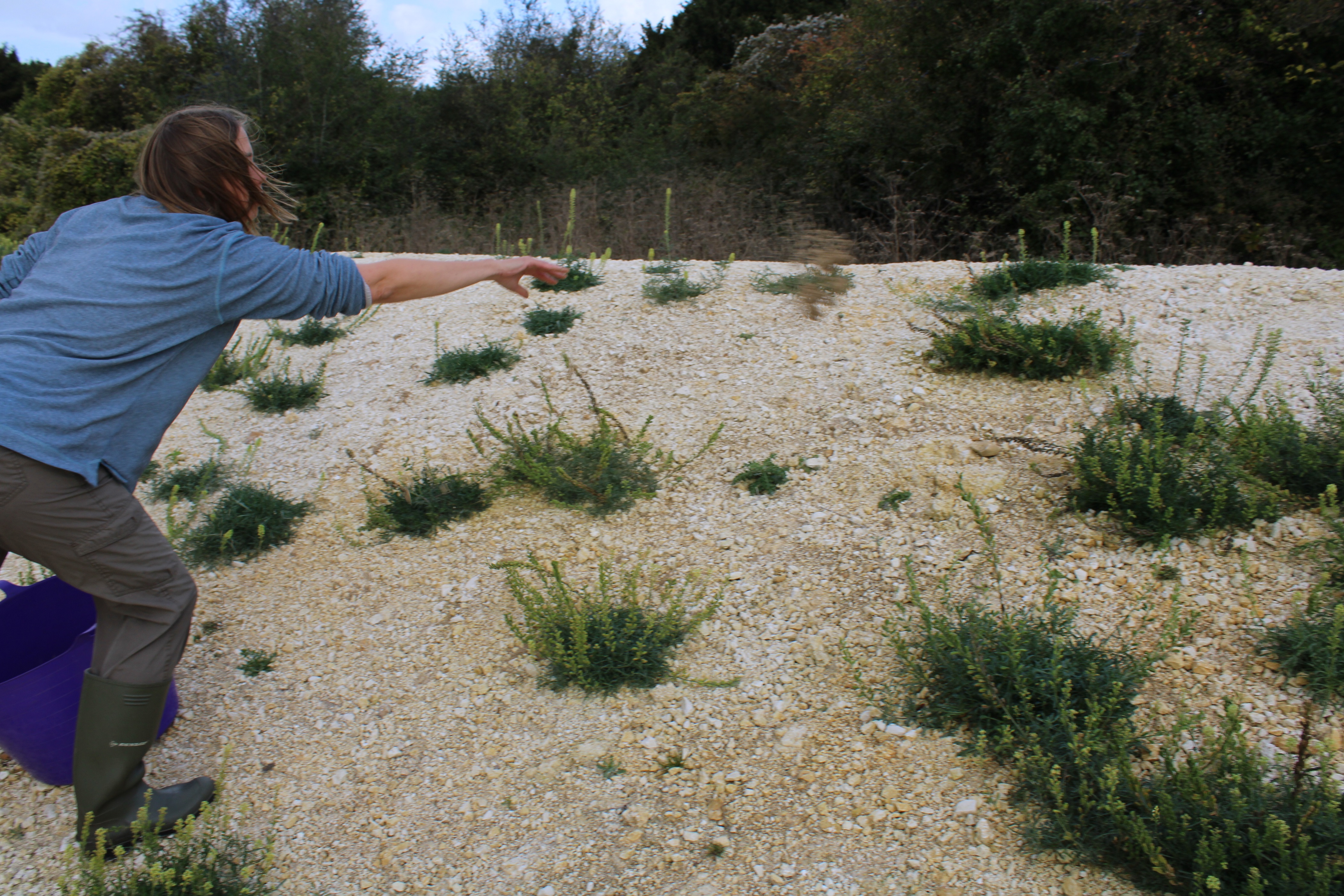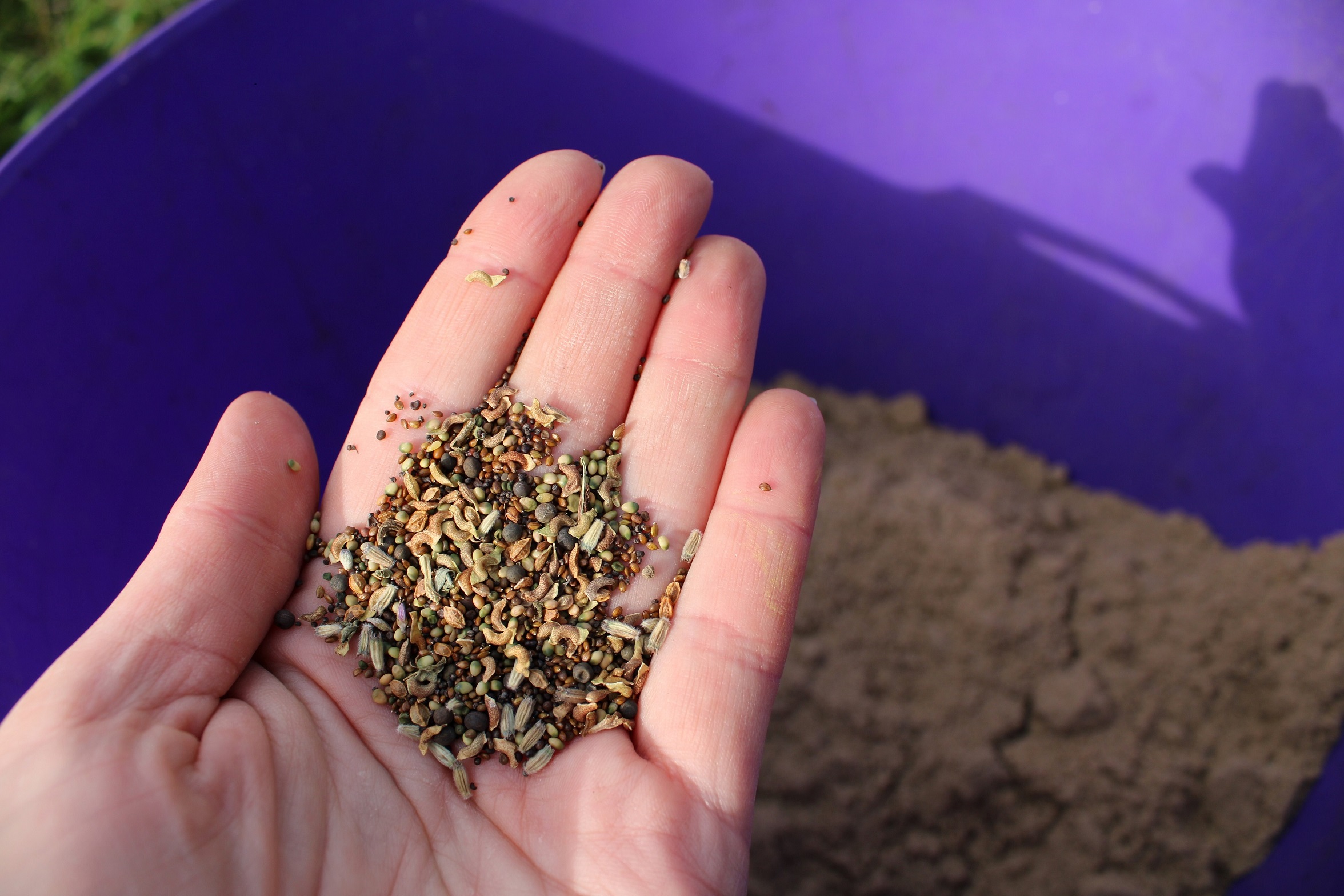Martin Down farmers creating spaces for rare butterflies on Dorset-Hampshire border
15 farmers working together to support wildlife alongside productive agriculture
Rare butterflies and bees will find refuge in the countryside on the Dorset – Hampshire border after two new butterfly banks were created on the Martin Down Farmer Cluster. The chalk banks, on farmland close to the Martin Down National Nature Reserve, have been planted with kidney vetch and seven species of native wildflowers. The rare Small Blue Butterfly lays its eggs, lives and feeds exclusively on kidney vetch.
The Martin Down Farmer Cluster is a group of 15 farmers who farm the area around the nationally important Martin Down National Nature Reserve. Since 2017 they have worked together to support the wildlife which make their home on the reserve and surrounding farmland by improving and developing wildlife-friendly habitat alongside productive agriculture.
The new butterfly banks were created on a farm within the Cranborne Estate which is part of the Martin Down Farmer Cluster. The project was funded by Natural England as part of a wider project of species enhancement through their ‘Creating Spaces for Species’ project and managed on their behalf by the Dorset-based Footprint Ecology. The chalk banks for small blue butterfly were part of a range of projects including scraping away the soil and sowing juniper seeds on Martin Down National Nature Reserve
Megan Lock, Farmland Biodiversity Advisor with the Game & Wildlife Conservation Trust (GWCT), is the Farmer Cluster Facilitator. She provides conservation advice and support to the farmer cluster and helped facilitate the project. Megan said:
“After the banks were constructed, we planted nearly 400 kidney vetch plug plants, as well as seeding the banks with Horseshoe and Tufted Vetches, Common Bird’s-foot-trefoil, Self-heal, Lady’s Bedstraw, Devil’s-bit Scabious and Salad Burnet.
“These plants should thrive in the nutrient-poor soil but still leave lots of bare earth for mining bees and burrowing wasps. The Small Blue Butterfly has been chosen by the cluster farmers as one of their priority species. This new habitat should help them increase their range around the Martin Down NNR. The new butterfly banks will also be included in our monitoring programme so we will be able to measure the impact of this conservation work.”
The Small Blue Butterfly is known for being the smallest butterfly found in the UK, although it is not particularly blue in colour. The chalk downland of the Martin Down National Nature Reserve is a key stronghold for this threatened species.
The banks are approximately 30m long and 1-2m high but are situated on slopes so look much larger with a south-facing flank. They were constructed by digging a trench and burying the topsoil from the bank and adjacent scrape. The chalk sub-soil is then mounded on top covering the topsoil. This created bank and scrape features that are approximately 600-900 sq m in size.
The Martin Down Farmer Cluster is one of around 200 similar groups of farmers working together for wildlife in the UK. The Martin Down farmers have chosen turtle dove, hedgehogs, harvest mice, arable flora, bumblebees, small blue butterfly, dark-green fritillary, Duke of Burgundy and lapwing, soil organic matter and chalk downland as the priorities for their conservation work.
Since forming the farmer cluster in 2017, the Martin Down farmers achievements have included planting more than 10km of new hedgerows and increasing pollinator habitat by 50%, installing barn owl boxes, creating 21 turtle dove puddles and ponds and five new butterfly banks, creating habitat for grey partridge and monitoring hedgehogs. As facilitator Megan carries out wildlife monitoring to measure the impact of their work.
The new butterfly banks were created with the help of the staff of Cranborne Estate and Footprint Ecology.
Ends
Note to editors:
Farmer Clusters: farmerclusters.com
The Martin Down Farmer Cluster is one of more than 200 farmer clusters across the UK. Farmers and land managers do a lot for Britain’s rural environment, but there is only so much that an individual, acting in isolation, can achieve on their own. By working together, helped by an advisor or ‘facilitator’, farmers and land managers can work together to collectively deliver greater benefits for soil, water and wildlife at a landscape scale.
The Game and Wildlife Conservation Trust (GWCT) helped develop the concept and establish the ground-breaking farmer-led Marlborough Downs Nature Improvement Area project in 2012, and then the first pilots of ‘farmer clusters’ in partnership with Natural England in 2014.
The Game & Wildlife Conservation Trust gwct.org.uk – providing research-led conservation for a thriving countryside. The GWCT is an independent wildlife conservation charity which has carried out scientific research into Britain’s game and wildlife since the 1930s. We advise farmers and landowners on improving wildlife habitats. We employ 22 post-doctoral scientists and 50 other research staff with expertise in areas such as birds, insects, mammals, farming, fish and statistics. We undertake our own research as well as projects funded by contract and grant-aid from Government and private bodies.
Natural England’s Species Recovery Programme (SRP) has operated since the early 1990’s and has been a key conservation delivery mechanism which supports targeted action for England’s threatened and declining species. Whilst traditional conservation measures such as landscape-scale habitat improvement have led to improved prospects for many common species, some highly threatened species require specialised interventions to ensure their survival. The Species Recovery Programme operates through a series of partnership projects with major conservation charities and scientific institutions including RSPB, Butterfly Conservation, Plantlife, as well as locally driven projects that provide this bespoke management for species on the brink of extinction.
Footprint Ecology https://www.footprint-ecology.co.uk/ – is an ecological consultancy based in Dorset focussing on the interface between people and nature. Our dynamic team is passionate about ecology, conservation and natural history. We work with those that share our values in the most ethical and sustainable way we can. We provide services in conservation management, planning policy, countryside access and ecological survey and analysis.
Press release distributed by Pressat on behalf of Game & Wildlife Conservation Trust, on Thursday 17 November, 2022. For more information subscribe and follow https://pressat.co.uk/
Farmer Cluster GWCT Wildlife Habitat Conservation Butterfly Bees Dorset Hampshire Martin Down Natural England Agriculture Food Production Charities & non-profits Environment & Nature Farming & Animals
You just read:
Martin Down farmers creating spaces for rare butterflies on Dorset-Hampshire border
News from this source:



